|
Greetings Friends in
the Name of Safety:
We still have a few seats available at
our Asheboro, NC APCAP this month,
October 27 - 31, 2008! Please make hotel
reservations directly with the Quality
Inn Asheboro, 242 Lakecrest Road,
Asheboro, NC 27203; (336) 626-3680. When
making reservations, please mention
NCIC, which is the Promotion Code for
special room rates!.
To register for our Asheboro Zoo event
Click HERE
Your
REGIONAL SAFETY COUNCILS are
continuing to work for you, so please
refer to the calendar section of our
Safety Bulletin for more information.
Please support YOUR councils!
As always, we thank you for your support
and we pledge to continue to serve your
needs. We promise to continue to provide
quality ACCIDENT
PREVENTION training programs.
|
Tread Lightly
on the Environment
 If
you're like many people, you're finding
it more and more difficult to ignore
your carbon footprint; that is, you're
becoming painfully aware of the effects
you're having on the earth every day,
just by living your life. It's good to
know, then, that there are hundreds of
little things you can do to minimize or
counterbalance your negative effects on
the planet. Here's ten to get you
started: If
you're like many people, you're finding
it more and more difficult to ignore
your carbon footprint; that is, you're
becoming painfully aware of the effects
you're having on the earth every day,
just by living your life. It's good to
know, then, that there are hundreds of
little things you can do to minimize or
counterbalance your negative effects on
the planet. Here's ten to get you
started:
1. Plant a tree - Trees absorb carbon
dioxide and other air pollutants, and
the shade and wind protection they
provide can even reduce your energy
bills!
2. Turn the faucet off - A faucet left
on unnecessarily for only 2 minutes
(about the time it takes to brush your
teeth) can waste up to 10 gallons of
water!
3. Pay attention to materials - Cloth
bags are better than paper or plastic at
the grocery store, and Styrofoam can
last over 500 years in a landfill
without biodegrading - material matters!
4. Pay your bills online - Putting an
end to paper bills not only saves paper
- it saves energy consumed by their
transportation, and also reduces the
pollution created by the same process.
5. Shop smart for appliances -
Appliances with Energy Star labels use
35 percent less energy than average and
can save you as much as 30 percent on
your utility bill.
6. Support local farmers - Not only do
home-grown vegetables just seem to taste
better, but buying from a local farmer
doesn't require that the crops be
trucked cross-country to be sold.
7. Take care of your car - If you must
drive, keep your car tuned up and your
tires properly inflated. The more
efficient your car is, the less CO2 it
emits.
8. Share - Almost any item uses energy
to be produced, so any time we share
what we already have, we save the energy
that would be consumed to produce a new
product.
9. Recycle ALL the time - Lots of people
recycle within their own household, but
when you're at a party or on a picnic,
for example, it takes a little extra
effort.
10. Change your light bulbs - Compact
fluorescent light bulbs last up to 10
times longer than standard bulbs and
don't use nearly as much energy.
|
No sleep is no good 
Everyone knows that
humans need sleep, and you're never more
aware of how much you need it than when
you don't get enough. For many people, a
lack of sleep is just a matter of poor
prioritizing. They might rank a clean
house, the latest reality TV show, or a
night out ahead of their need for rest.
Sleep gives your heart a much-needed
rest, regulates your appetite, energy
use, and weight, and gives your nerves a
chance to repair themselves. People who
don't get enough sleep could also be
depriving their immune systems of the
energy necessary to keep the body
healthy.
Try the following tips to make sure you
get your z's:
Establish a routine - Go to bed and get
up at the same time each day. This
should also include weekends.
Wind down first - Spend the 30 minutes
before bedtime doing something relaxing,
like taking a bath or reading a book.
Avoid caffeine and nicotine - Like
caffeine, nicotine is a stimulant and
should be avoided whenever possible, but
especially before bedtime.
Limit the function of your bedroom -
Keep distractions like computers and
televisions out of your bedroom. The
room should be clearly designated for
sleep.
Cough up some dough - You don't have to
spend a fortune, but you should invest
in a quality mattress and comfortable
pillows and bedding.
Exercise - Regular exercise should make
it easier to sleep, but only when done
several hours before bedtime.
A lack of sleep can seriously affect
your quality of life. Most adults need
between 7 and 9 hours of sleep per
night. You should never feel guilty for
getting your body the rest it needs, and
if nothing seems to help get the sleep
you need, consult a doctor. Not
addressing sleep problems can lead to
other issues including illness,
inability to deal with stress,
depression, and weight gain.
|
Falling is a risk in every
workplace
Slips, Trips & Falls
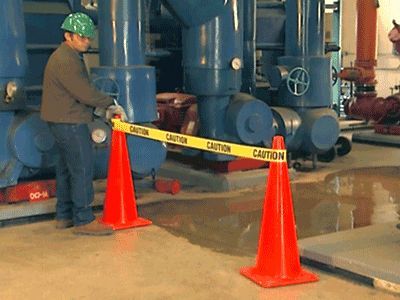
In December of 2007, a 37-year-old
window washer in New York survived a
47-story fall, but with two broken
legs, a broken arm, and many
internal injuries. Amazing as this
case may be, it is certainly not the
norm. In fact, people who fall from
even 4 or 5 stories can be killed,
and few people who fall from 10
stories or more survive.
While most employees who are injured
or killed by falls in the workplace
fall from a higher level to a lower
level, falls can (and do) happen on
level ground as well. Though your
risk may be greater if you work in
the fall-prone service or
construction industry, slips, trips,
and falls happen in every workplace.
No matter where you work, you can
always take steps to lower your risk
of being injured as the result of a
fall. You should:
- Turn on the lights before you
enter a room.
- Wear all recommended fall
protection.
- Clean up spills immediately.
- Utilize handrails.
- Keep walkways free of clutter.
- Wear slip resistant shoes.
- Never carry more than you can
handle, and make sure you can see
where you're going.
- Make wide turns around corners to
give yourself time to see what's
coming.
Finally, employers and employees
must work together to maintain a
work environment that is as safe as
possible. If you notice broken
stairs, burned-out lights, or
slippery areas, make sure your
employer knows about it so measures
can be taken to keep your work
environment safe
|
NCIC Video Library
Check out our
Video Library !
We are in the process of UPDATING our
online Video/DVD listings. Please be
patient with us.
To view the rest of our Library and
download the REQUEST FORM, please
CLICK HERE
|
Get To Know Your Commissioners
Commissioner Dianne C.
Sellers
Governor Mike Easley has reappointed
Dianne C. Sellers to a six-year term as
Commissioner. Governor Jim Hunt
initially appointed her as Commissioner
in September 1994 after the General
Assembly expanded the Industrial
Commission from three members to seven.
Effective August 1, 2000, she was
reappointed by Governor Hunt to a term
expiring in April 2001. Commissioner
Sellers previously held the post of
Chief Deputy Commissioner for eight
years and had served as a Deputy
Commissioner for the eight prior years.
She formerly worked as a trust
representative in the Wachovia Trust
Department; press secretary for U.S.
Representative Roy A. Taylor (11th
District, N.C.), in Washington, D.C.;
and law clerk for Bailey & Thomas, P.A.,
in Winston-Salem, N.C.
She received a B.A. degree in history
from Mary Baldwin College in 1970, and
earned a master's degree in history from
the University of North Carolina at
Chapel Hill in 1972. She also studied
liberal arts in Austria at the
University of Vienna. In 1976, she
earned a J.D. degree from Wake Forest
University School of Law, where she was
president of the Student Bar
Association.
Commissioner Sellers is a member of the
American Bar Association, North Carolina
Bar Association, and Wake County Bar
Association. Currently, she is serving
as council member for both the Alternate
Dispute Resolution Committee and the
Workers' Compensation Committee of the
North Carolina Bar Association. She is
also chairman of the Adjudication
Committee of the Southern Association of
Workers' Compensation Administrators and
chair of the Credentials Committee of
the International Association of
Industrial Accident Boards and
Commissions. In addition, she received
an appointment to the five-member Board
of Regents of the International Workers'
Compensation College.
To e-mail Commissioner Sellers
CLICK HERE.
|
Strategies to
De-stress

Most people would probably say that a
reduction in stress in their lives would
be a welcome change. If this is true for
you, try the following strategies to
reduce tension in your life:
Plan for disasters, delays, and
distractions -You might get up 15
minutes earlier than usual; keep your
gas tank at least half-full; make copies
of all keys and give them to a relative,
neighbor, or friend; or make lists
instead of relying on memory alone.
Relax - Plan downtime into your day -
even 10 minutes of quiet time to think
about what's really important can help.
You may also find that eliminating or
reducing your caffeine intake helps you
to calm down.
Be a positive person - Remembering the
positive can be difficult, but is
extremely powerful in helping to keep
stress from dragging you down. You might
also find that doing something nice for
someone else can lift your mood and
replace tension with a satisfied
feeling.
|
|

Sign, Sign,
Everywhere a Sign
By Michael Nance
Remember that tune? Bet you
don't know the band's name. Okay, okay!
I'll give you a few more lines:
"And the sign said long
haired freaky people need not apply. So I
tucked my hair up under my hat and I went in
to ask him why. He said you look like a fine
upstanding young man, I think you'll do. So
I took off my hat and said imagine that,
huh, me working for you."
Written in 1970 by Five Man
Electrical Band. Wow, takes you back
doesn't it! I heard this tune the other day
as I was pulling into my neighborhood and
staring at a yard full of political signs.
What a sight, I thought.
Tis the season! No, I don't
mean fall festivals, Halloween and all of
the other celebrations associated with the
last quarter of the calendar year. I'm
talking about election season. I don't know
about you, but I feel like election season
gets longer and longer! Friends, we are
right in the middle of fierce competitions
at the local, state and federal levels. Not
to mention the brutal opposition that occurs
each time my father-in-law comes to my house
and he and I have our own version of
"Hardball"!
The Safety Education Section
wants you to know that even in
politics your safety can be jeopardized.
Let's take for instance, political signs.
These signs pose potential hazards if they
are improperly placed. Campaigns invest a
great deal of money in these signs hoping to
sway voters. Signs can obstruct your view,
distract your attention, or endanger the
safety of the individual erecting the sign.
Personally, a candidate's sign has never won
or lost my vote. I think the signs are a
nuisance. But be careful; I was reminded by
my wife that it is a serious crime to remove
a neighbor's political sign from their
yard. (Your secret is safe with me though).
Another safety issue that
comes with election season is stress. We all
know stress can weaken the immune system.
Just trying to get some actual news from one
of the 24 hour news stations is impossible
unless you want to watch the political
campaigns in action. Even the commercials
have ads filled with promises, rhetoric and
attacks. I open my mail box (both snail and
'e') and there ya go, political mailers,
e-rumors, etc. I answer the phone and am
immediately asked to participate in the
latest "poll" so each side can pull out some
other form of maneuvering probably loaded
with scare tactics. Even my two children are
participating in elections at the elementary
and middle schools and seem confused over
who to vote for (granted, they get that
confusion honestly since my wife and I are
on TOTAL opposite ends of the political
spectrum).
So, how are we going to make
it to November with all of these political
signs and added stress? Well, there is no
specific "political stress relief" program
(yet) and it is only going to get worse. I'd
like to say try to tune it all out and hope
for the best. But that's hard to do and
burying your head in the sand doesn't do
anything. Just today the stock market took
its hardest point hit ever, 777 points. I
sure hope there's been some rebound by the
time this is printed. I know personally of
some folks that have lost thousands on
Wachovia stock this week. The only thing we
can do is become educated the best way we
can and vote. Vote so your voice can be
heard.
Sidebar:
The Safety Education
Department has a topic titled "Emergency
Action Plan" and it deals with different
types of emergencies that could take place
at work. I always try to include home-life
stuff in all of my sessions and this topic
is no exception. One question (or hands-on)
activity I like to do is ask; "If you are
given 15 minutes to get everything out of
your house that you can, what would you
get." Photos? Computer?, your Beatles
Album collection? (Assuming your family is
already safe). At the very least you should
save the Van Morrison stuff. Seriously,
having an evacuation plan at home is just as
important as having a written plan at work.
Many lives could be saved if only there were
an Emergency Action Plan. Especially with
kids in the house. Try it sometime during a
family night. Get everyone together and
talk about the plan and then actually do
it. You might be surprised just how much
your kids retain the information. Not to
mention the questions that they might ask.
Granted, some of their questions may be a
little off base but remember; if they asked,
it is important to them.
After your emergency action
plan drills, turn off the TV and turn on the
stereo. Get some of those classic tunes out
and turn it up. I just got a thought.
Maybe I can turn my speakers towards the
neighbor's window and play the "Sign" tune.
Below 85 decibels of course. I might need a
secondary emergency action plan.
Editor's
note: Michael Nance is the NCIC Blue Ridge,
Southern & Western Piedmont areas Safety
Representative. If you are interested in
having one of our programs in your area,
please give Michael a call at 919-218-9047
or email him at Michael.Nance@ic.nc.gov.
|
Serving in Safety
By Mike
Bingham
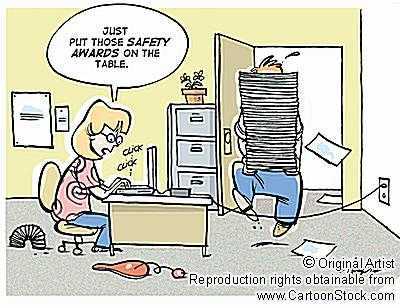 One
of my favorite sayings comes from Zig Ziglar,
who said,
"You can have everything in life you want,
if you will just help other people get what
they want". One
of my favorite sayings comes from Zig Ziglar,
who said,
"You can have everything in life you want,
if you will just help other people get what
they want".
Now Mr. Ziglar's quote seems
pretty simple at first, but I had to digest
it for a while before I really
started to see it link up to the things in
my world. When I started bouncing the idea
off of safety it started to come home to me.
As a "safety person" it is
awfully easy to be perceived as a roadblock
when it comes to your trying to be diligent
in building or maintaining a safe
workplace. It can seem like the safety
person is always the bearer of bad news. If
we point out a problem in a machine design
or work process, regardless of how valid and
serious the problem is, we can be placed in
a situation in which it will be difficult or
impossible to win. Sometimes even the best
solutions cause strife. Anyone can find
reasons a process or idea won't work or why
it will be hard to do. Our observations
can be seen as interference, no matter how
hard we try to help the situation. Our
task, then, is to find out what people want
and help them get it.
"You can have everything
in life you want, if you will just help
other people get what they want". In a
given safety scenario, we need to identify
all the stakeholders and identify exactly
what they want, then try to help them get
it. Of course we can't compromise our duty
to maintain a safe workplace just to give
other people what they want. We have to
find the way to give them what they want in
a safe, effective manner.
If a guard on a machine is
inadequate, we, as "safety persons", have to
find a solution that safely serves all the
stakeholders. We would be the resource that
initially follows the hierarchy of safety
controls. Can we eliminate the hazard, and
as a result eliminate the need for a guard?
If not, can we engineer the hazard out so
there is no exposure to the hazard? If we
are forced to keep a guard of some sort on
the machine, we should be the person who
talks with the stakeholders and helps build
a guard that serves the whole enterprise as
interference-free as possible.
To do this we would help the
engineering or maintenance department
understand the problems and constraints if
needed. We would help the operator by
listening for concerns and helping design
the guard to facilitate the activities he or
she will conduct at the machine. We would
help the operators make their process safer,
faster, easier, and more comfortable. We
would help the supervisor get more and
better product off the line and on the truck
faster and safer. We would put the results
on display with the Worker's Comp carrier to
reduce costs to our company.
"You can have everything in life you want,
if you will just help other people get what
they want".
As "safety persons" our job is to provide a
service to others people around us. We are
consultants who will often have to explain,
train, and educate others. If we are
successful in helping other people get
whatever it is they want, they will be back
for more. More people coming back will help
us get whatever it is we want, things like
watching co-workers go home safe at the end
of their workday, knowing we prevented an
injury, knowing we 'fool proofed" a process
so everyone now gets a free ride. We get to
come to work with the expectation of being
able to serve others through our chosen
occupation, and that's some pretty good
ground to walk on!
Editor's Note: Mike
Bingham is the Western Area Safety
Representative for the NCIC, and one of the
10 members of the NCIC's Safety Department
who are out there Working for You!!!to
make N.C. workplaces safer and better by
reducing injuries to employees and saving
money for employers through education and
training. You can contact Mike at:
mike.bingham@ic.nc.us or call:
919.218.9045
|
From the Desk of
Dennis Parnell

Director Safety Education
Trainers need training too!
In most organizations, employees must
receive some sort of training during their
employment. However, few employees will have
identical learning styles, and perhaps even
fewer employees will have identical
backgrounds. Both factors affect how
employees process information.
Trainers in the business world must be
acutely aware of the kinds of challenges
they will face in teaching a diverse
workforce. For example, in any one group of
employees, there might be one student who
cannot manage her time, another who has
difficulty sitting still, and yet another
who struggles to overcome cultural
differences in a classroom setting. Trainers
who invest time in learning to negotiate
different learning styles and cultural
differences will be the most successful.
Trainers can ease classroom trouble by using
open-ended questions, speaking slowly and
clearly, and welcoming feedback from
students. Most of all, trainers should
expect that employees will be diverse and
respect the differences they bring into the
classroom.
Now you know. Dennis :)
|
|
CONGRATULATIONS ATLANTIC BEACH
APCAP CLASS!
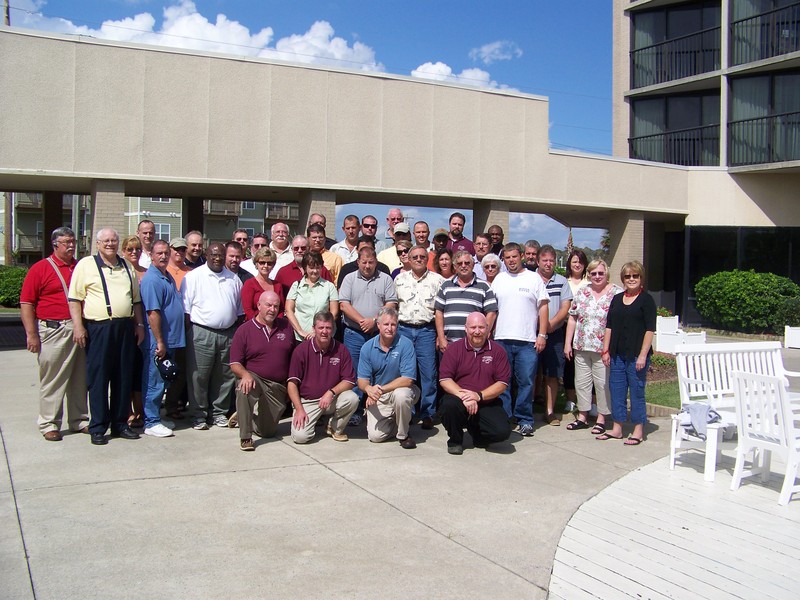
Please join us in
welcoming our latest group to
complete our Accident Prevention
Certificate Awareness Program
As always, it is one
of our greatest pleasures
participating in this series of
training throughout our great state.
The networking, learning and
fellowship is
PRICELESS! We look forward to
Asheboro Zoo, please join us!
|
Insight!
Fun and useless tidbits

Aspirin went on sale as
the first pharmaceutical drug in 1899,
after Felix Hoffman, a German chemist at
the drug company Bayer, successfully
modified Salicylic Acid, a compound
found in willow bark to produce Aspirin.
In an article in 1998, The Journal of
the American Medical Association claimed
that adverse drug reactions may cause
more than 100,000 deaths a year in the
US alone.
American and Russian space flights have
always included chocolate.
Bananas are America's #1 fruit.
In 2001, there were more than 300
banana-related accidents in Britain,
most involving people slipping on skins.
At the age of 26, Michelangelo began
sculpting his monumental statue of
David. He finished it seventeen months
later, in January, 1504.
Jayne Mansfield decorated her "Pink
Palace" by writing to 1,500 furniture
and building suppliers and asking for
free samples. She told the donors they
could then brag that their goods were in
her outlandish mansion. The pitch
worked, and Jayne received over $150,000
worth of free merchandise.
|
|
Coming November 6, 2008, Smithfield Town
Hall

Town
Offering Teen Driver Safety Class
Due to the high number of teenage fatalities
on Johnston County roadways, the Town of
Smithfield will offer a four-hour driving
class for teen's ages 15 to 19 entitled
"Alive at 25." The class will be held on
Thursday, November 6, 2008 from 5 until 9 pm
at the Smithfield Town Hall Council
Chambers. The Town will purchase books for
all employees' teen drivers wishing to
attend. Non-town employees' children will
have to pay $5.50 for an instructional book.
The deadline to register is October 22. The
instructor for the class will be Mel Harmon
with the
N.C. Industrial Commission Safety Education
Section.
For more information or to
sign up for the program call or email
Smithfield Town Clerk
Debbie Godwin at 919-934-2116
Extension1108. |
|
What Folks Are
Saying
Mr. Harmon,
Your presentation at Murphy Medical Center a
few weeks back about defensive driving was
excellent. It opened my eyes about a couple
of things I was in the habit of doing that
was not safe.
I would like to know how to get one of the
booklets that I think was titled "Alive at
25" for the young drivers. I would like to
give this to my two sons, 18 and 16.
Thanks for your help and again for the good
program you brought. -
Vance
Ingle, P.T., MMC
Rehab
Manager
____________________________________________
Dennis, just wanted to send you a THANKS for
letting the City of Fayetteville enjoy Mel
Harmon for a few hours.
Mel taught a DDC-4 class in City Hall today;
in attendance were CDL drivers, Police
officers, Fire Fighters and supervisors. As
usual he did a great job and kept everyone's
attention. I heard nothing but positive
comments from those in attendance.
We are grateful to the NC Industrial
Commission for the outstanding training that
you provide to the citizens of North
Carolina. -
Greg Schaefer, Safety Officer
City of
Fayetteville
____________________________________________
Guys,
I would like to say thank you for the week
of
meetings at the Sheraton in Atlantic Beach,
I
felt that it was probably one of the best I
have attended. I felt such a warm welcome,
not just to me but to my family also. The
professionalism was outstanding. I really
enjoyed getting to know the people and felt
that everyone was so friendly and kind. I so
enjoyed the fellowship, the teamwork was
wonderful, and I came away with very
valuable
information to share with our employees back
home.
Looking forward to future meetings together!
- Lonnie
Sorrell, APAC, Greensboro
|
|
About N.C. Industrial Commission
Safety Section
The N.C. Industrial
Commission Safety Education Section stands
ready to assist you with your Safety
training needs. We offer a variety of
courses, designed to suit your needs. Please
give one of our Industrial Safety
Representatives a call.
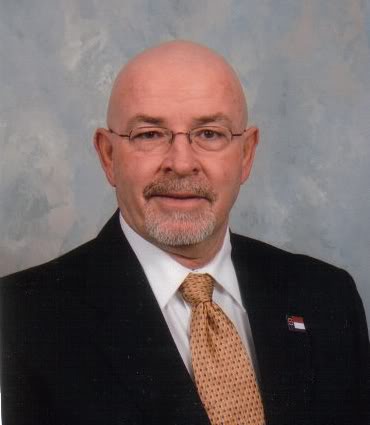 DENNIS
PARNELL DENNIS
PARNELL
Director Safety Education
919-218-3000-Cell
919-807-2602
Dennis.Parnell@ic.nc.gov
 KIM
NADEAU
Program Assistant
919-807-2603
919-218-9049-Cell
Kim.Nadeau@ic.nc.gov
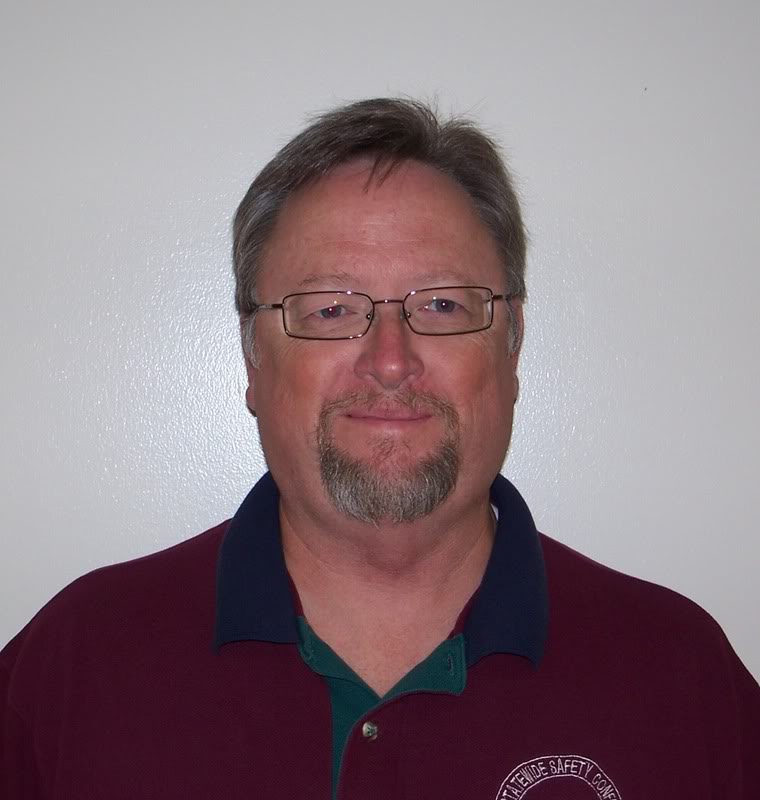 RANDY
CRANFILL RANDY
CRANFILL
APCAP & APW Coordinator
919-218-2986
Randy.Cranfill@ic.nc.gov
 ALVIN
SCOTT ALVIN
SCOTT
Eastern & Northeastern Areas, Eastern
Defensive Driving Instructor
919-218-2792
Alvin.Scott@ic.nc.gov
WE ARE WORKING FOR YOU!
|
|
|
|
Quick Links
One Resort Drive
Asheville, NC
|
|
Quick Links
The Deputy Commissioners serve as judges in
hearings for contested cases. Deputy
Commissioners must be attorneys and have a
background in workers' compensation cases.
Click here to e-mail Stephen Gheen, Chief
Deputy Commissioner
READ MORE...
|
|
Quick Links
NC Workers' comp Educational
Conference
|
|